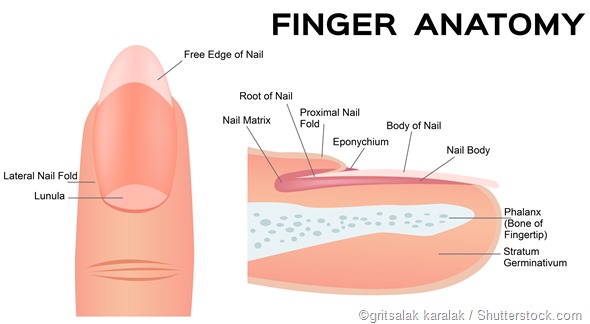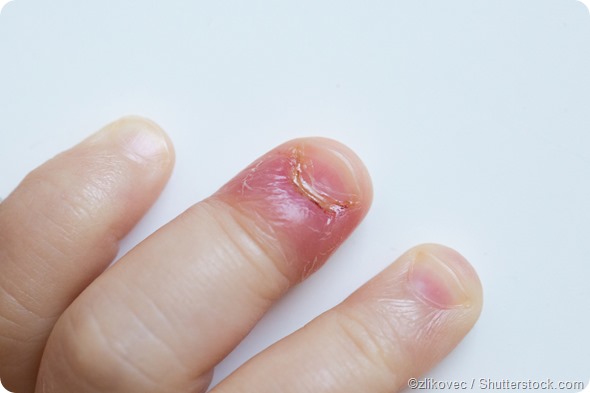The nail is the distal keratinized plate that covers the outermost dorsal part of the finger. It arises from the nail matrix, which is the germinal part of the nail plate under the nail. The nail fold is the tissue that encloses the nail matrix at the root of the nail. It attaches the nail to the rest of the skin through the protective cuticle.

Paronychia is a common infection that afflicts the skin around the nails. Causes may range from primary to secondary infections occurring as a result of a hangnail or picking off the cuticle.
Causes of paronychia
Paronychia may be due to bacterial, fungal or viral pathogens. In many cases a bacterial infection may be superimposed on a fungal infection. The infection is often introduced by injury, or by stress. It occurs three times as frequently in women as in men.
Fungal paronychia is more common in those who are diabetic, as well as those who wash their hands a lot.
Types of paronychia
Paronychia may be acute or chronic, depending upon the development of the infection over a few hours or lasting more than 6 weeks, respectively.
Symptoms
With an infection of the skin around the nails, the skin becomes red, swollen and painful. In many cases the infection is around the cuticle or associated with a hangnail. Some bacterial infections may produce fluid vesicles.
It is possible to distinguish between fungal and bacterial paronychia by the speed at which the symptoms develop. Bacterial infection has an acute onset.
In addition to the obvious signs of inflammation, the nails may show discoloration or changes in shape. If the paronychia is part of a more systemic illness, features of generalized infection may present such as fever, malaise, joint pain and red streaks along the affected part of the body due to infected lymph vessels.

Complications
In some patients, nail infections may produce permanent changes in the nail. Some infections may lead to abscess formation. Rarely, the infection may spread to involve the bone, or enter the bloodstream.
Diagnosis and management
Diagnosis of paronychia is a purely clinical one. However, pus culture may be performed if there is severe infection, or if vesicles are present.
Treatment with appropriate antibacterial agents is usually effective - oral antibiotics are commonly prescribed.
In addition, it is useful to soak the fingernail(s) in hot water several times a day to soften the skin and relieve the pain and swelling in bacterial paronychia. If pus is formed, an incision may be necessary to let it out. In a few cases where the pus is infiltrating under the fingernail, part of the nail may have to be removed to allow drainage.
Management of fungal paronychia involves keeping the hands dry and applying an antifungal ointment is advised. Substances which dry out the skin, such as Castellani paint, are also useful.
Prevention
Keeping the nails free of infection is a process which should not be neglected. Some steps to adhere to when you trim your nails are as follows:
- Trim your nails after your bath when they are softer.
- Trim your fingernails once a week, and toenails once a month.
- Keep the fingernails trimmed with a slight curve, but the toenails straight across, to prevent hangnails from forming.
- Use sharp scissors or nail clippers to trim your nails and smooth rough edges gently with an emery board.
- Do not pick loose bits off the nail to avoid tearing the nail bed or the cuticle. Cut them off neatly with a clean sharp pair of scissors or a nail clipper.
Other precautions include:
- Push the cuticle back gently and regularly.
- Avoid trauma to the nails because nails grow and heal very slowly, from 0.01-0.03 mm a day.
- Never bite your nails.
- Prevent chemical injury by using protective gloves when you work with detergents or chemicals of any sort.
- Use your own personal manicure set even when you hire a manicurist to tend to your nails.
- Never trim your cuticles either using an instrument or with a chemical cuticle remover. This can allow the skin at the base of your nails to be injured which lets infection enter the nail fold or nail bed.
References
- https://medlineplus.gov/ency/article/001444.htm
- http://www.ncbi.nlm.nih.gov/pmc/articles/PMC3884921/
- http://www.nhs.uk/conditions/nail-abnormalities/Pages/Introduction.aspx#Beaus
Further Reading
Last Updated: Feb 27, 2019